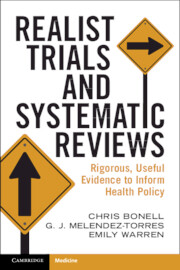Book contents
- Realist Trials and Systematic Reviews
- Reviews
- Realist Trials and Systematic Reviews
- Copyright page
- Contents
- Figures
- Tables
- Boxes
- Acknowledgements
- Chapter 1 Introduction
- Chapter 2 Why Are Trials and Systematic Reviews Necessary but Currently Insufficient to Inform Health Policy?
- Chapter 3 Realist Critiques and Manifesto for Evaluation and Reviews
- Chapter 4 Building Realist Theory in Evaluations
- Chapter 5 Refining Realist Theory through Process Evaluations
- Chapter 6 Testing Realist Theory through Trials or Other Evaluation Designs
- Chapter 7 Building and Refining Realist Theory in Systematic Reviews
- Chapter 8 Testing Realist Theory through Synthesising Outcome Evaluations
- Chapter 9 Using Evidence to Inform Intervention Scale-Up and Transfer
- Chapter 10 Using Evidence to Refine Middle Range Theory
- Conclusion
- References
- Index
Conclusion
Published online by Cambridge University Press: 08 February 2024
- Realist Trials and Systematic Reviews
- Reviews
- Realist Trials and Systematic Reviews
- Copyright page
- Contents
- Figures
- Tables
- Boxes
- Acknowledgements
- Chapter 1 Introduction
- Chapter 2 Why Are Trials and Systematic Reviews Necessary but Currently Insufficient to Inform Health Policy?
- Chapter 3 Realist Critiques and Manifesto for Evaluation and Reviews
- Chapter 4 Building Realist Theory in Evaluations
- Chapter 5 Refining Realist Theory through Process Evaluations
- Chapter 6 Testing Realist Theory through Trials or Other Evaluation Designs
- Chapter 7 Building and Refining Realist Theory in Systematic Reviews
- Chapter 8 Testing Realist Theory through Synthesising Outcome Evaluations
- Chapter 9 Using Evidence to Inform Intervention Scale-Up and Transfer
- Chapter 10 Using Evidence to Refine Middle Range Theory
- Conclusion
- References
- Index
Summary
This conclusion summarises how realistic trials and realistic systematic reviews offer a method by which evaluation and evidence synthesis can become more useful by becoming more scientific and moving beyond being a form of sophisticated descriptive monitoring of ‘what works’. Evaluation can become more scientific both by continuing to use the most scientifically rigorous methods, as well as by being focused on the testing and refining of scientific theory. Critical realism and realist evaluation approaches offer a useful framework for constructing such theory because they offer the most plausible account of how causality operates in the complex social world. We hope that, by making these arguments, we have persuaded readers that trials and systematic reviews need to be reoriented and reformed rather than thrown away altogether. The incorporation of realist enquiry methods into randomised trials and systematic reviews offers us the best hope of evaluation and evidence synthesis that generate evidence which is both more scientific and more useful.
Keywords
- Type
- Chapter
- Information
- Realist Trials and Systematic ReviewsRigorous, Useful Evidence to Inform Health Policy, pp. 99 - 101Publisher: Cambridge University PressPrint publication year: 2024

